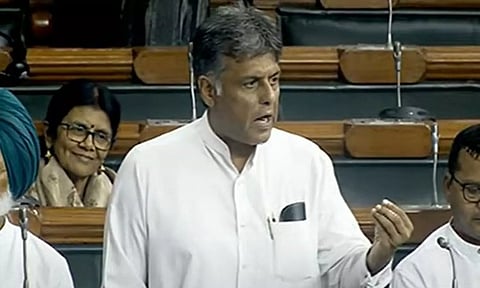

NEW DELHI: Congress Lok Sabha MP Manish Tewari on Monday said that the time has come to take the anti-defection law which has been enshrined in the 10th schedule of the Indian Constitution adding that this law is unable to achieve its objective due to the rising incidents of defections in the previous years.
"Time has come to take cognizance of the anti-defection law which is enshrined in the 10th schedule. Incidents that have happened in the previous years suggest that this law is failing to achieve its objectives. It has created a negative impact on the parliamentary system," Manish Tewari said while addressing Lok Sabha on the first day of the special session of Parliament.
The introduction of the Tenth Schedule in the Indian Constitution was aimed at curbing political defections. The Government introduced the Constitution (Fifty-second Amendment) Bill in the Lok Sabha on 24 January 1985 which led to amendments in Articles 101, 102, 190, and 191 of the Constitution to provide the grounds for vacation of seats for the disqualification of the members; and also inserted Tenth Schedule. The Bill was passed by the Lok Sabha and the Rajya Sabha on 30 and 31 January 1985, respectively. He further stated that the number of the sittings of the Parliament has been reduced and a law should be passed to ensure that Parliament must meet for 120-130 days.
"A law should be brought so that Parliament can meet for 120-130 days. Today's situation is that even Legislative Assemblies are meeting for 7 days. Those Assemblies that are big in size should meet for 100 days and those that are small in size should meet for a minimum of 75 days per year," he said.
He also recalled the important Articles that were enshrined in the Indian Constitution and said that they played an important role in forming an equal society.
"Article 17 countered practices of untouchability, Article 18 ended the Kingship practices, and Article 23 was brought in to counter the practices of forced labour. All this happened due to the wisdom of Jawaharlal Nehru, Sardar Patel, and Maulana Azad and they played an important part in the vision of creating an equal society," he said.
"Laws such as nationalisation of Banks in 1971 so that poor can have access to banks, the introduction of Panchayati Raj acts, Right to education, Right to information, National food security act played an important role in India's journey," he added.
Earlier, Prime Minister Narendra Modi on Monday recalled the emotional moment of his entering the Parliament as an MP for the first time in 2014, saying he bowed down to honour the temple of democracy and could have never imagined that a child belonging to a poor family would be able to enter the Parliament.
Initiating the discussion on the ‘Parliamentary journey of 75 years starting from Samvidhan Sabha – achievements, experiences, memories and learnings’ in the Lok Sabha, the Prime Minister also referred to the Parliament shifting to the new building on Tuesday and said “bidding goodbye to this building is an emotional moment”.
The Special Session of Parliament began on Monday and will continue till Friday.